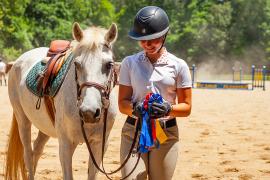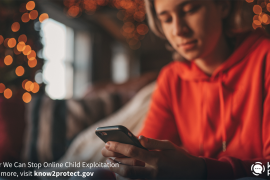As public health officials work to deliver the vaccine to communities across the US, conditions increasingly look promising for camps to open safely this summer. But what should camps expect to see in the campers, many of whom will be arriving after a year-plus of isolation in their homes, with little social engagement or in-person learning?
In my work as a parent educator and author who speaks about supporting children's social and emotional growth, I keep hearing this question from adults who want to know how to best prepare for the post-pandemic environment. So I drew on my own research in writing The Good News About Bad Behavior, as well as reaching out to several colleagues who are part of Parenting in Place, a masterclass series serving parents, educators, counselors, and camp staff. We offer these strategies for making what could be the hardest reentry to camp into the best experience ever for campers — with the greatest opportunity for growth.
Focus on Relationship
We are all connection-deprived after a year of lockdown and physical distancing. For children, camp will be a welcome antidote to this deficit, and these relationships are needed more than ever for their healthy development. "A lot of camps that have been operating realize it doesn't matter what activities you're offering," says Audrey Monke, author of Happy Campers and owner of Gold Arrow Camp. "All that matters is that connection and that relationship."
That doesn't mean the transition will be easy. Expect that some campers may feel overwhelmed by the contrast between being isolated for a year and being around crowds of people at camp. Make room for talking about how they feel, and plan more get-to-know-you activities than usual, to build connections.
"We can expect kids to have lots of different emotions," says Janine Halloran, author of The Coping Skills for Kids Workbook. "They're excited to see their friends. It's a little scary because they maybe haven't seen people in person frequently or not for long periods of time."
Children may worry that they won't recognize a friend, especially if it's been two entire years and they are taller and may have changed their haircuts. Walk through those feelings together with kids, and help them realize they're normal.
Monke suggests explicitly teaching introductions and conversation and listening to normalize the acquisition of social skills. "Instead of pulling aside the one kid who isn't good at listening, normalize that listening is something we all need to learn. Do group activities that foster those skills. It makes everyone feel like, ‘I am working on this, but so is my counselor and so is my cabin mate. It's not me having this terrible deficit.' "
At Gold Arrow Camp, the entire camp practices introducing themselves to a new person, with a smile and eye contact. They learn to ask a question as a way to forge a connection.
Recognize that some children have lost loved ones to COVID-19 or may have become sick themselves, says Nefertiti Austin, author of Motherhood So White. "Acknowledge a camper's feelings and provide space for emotions," Austin suggests.
Anticipate — and Head Off — Problems
Kids will be arriving with a range of different experiences and needs. Some were able to connect in-person with peers over the last year, or perhaps managed better with isolation. Others are practically emerging from a cave, and may experience erratic emotions, less self-control, difficulty managing frustration, problems sharing materials, more social anxiety, and the like.
"Just acknowledging that is important: ‘It's so exciting to be together, but wow, so many of us haven't been around so many people for a really long time,'" Monke suggests sharing. "‘Let's brainstorm what are some things we can do to make each other feel really comfortable and welcome here.'"
The first order of business should be to identify children who may need more support, and validate the feelings of uncertainty or shyness, says Madeline Levine, author of Ready or Not and Teach Your Children Well. "There are kids who are fine and others who are literally at the edge through this time. You have to make space and be curious about this range of experience," Levine says.
One useful exercise is an anonymous card pass. In a small group or bunk, counselors can ask a range of questions: "What was the worst thing that happened during the pandemic?" "What was the best thing?" "What do you think you'll remember about this year?" "How are you feeling about camp?"
Kids write their answers on a piece of paper or index card, which are collected and re-distributed to the group. Each child reads an answer, which was written by another child. (If you get your own answer, just read it as if it were new to you.)
"This avoids shame and embarrassment but gives the counselors some info about the group they're working with," Levine says. "They might ask a question about what would help going forward."
Because campers have missed the opportunity to practice problem-solving skills, they may show up at camp with less confidence, feeling more sensitive and needing more reassurance, says Phyllis Fagell, author of Middle School Matters.
"If their fellow campers are similarly insecure, they may not be able to give one another the positive feedback they crave," Fagell notes. "Some may have more separation anxiety after so much sustained family togetherness, while others will be desperate for independence and freedom. Some may try to drum up drama in a bid for attention they've been craving (and missing) during virtual learning, while others may struggle with basic social skills, such as listening without interrupting, entering a conversation gracefully or even making eye contact."
Camps and counselors should look for ways to reinforce and call out positive behavior, passing along compliments to campers, whether from a peer or a staff member. Help children learn to give each other the benefit of the doubt, assuming that someone means well. Be thoughtful about cabin and activity groupings, and open to adjusting if something's not going well.
"Be mindful of kids' varying social skills and needs and be thoughtful about how you mix them up, whether you're organizing bunks or pairing kids as swim buddies," Fagell says. "Hold weekly meetings to nip problems early and crowd-source solutions rather than dictating orders."
Offer Choice
For the last year, adults and children have experienced a loss of control because of the pandemic. We can't go where we want, socialize how we're used to, or learn, worship, and celebrate in person. Camp can help restore that sense of agency by offering choice — even more choice than usual.
Consider creating emotionally safe spaces, like a cozy corner or comfy bench or quiet zone, that all campers can use when needed, and will be recognized by others, Austin suggests. You can even enlist children in brainstorming solutions and putting together the space. "A reserved place will help kids respect each other's need for space and let kids know they are not being judged for needing a moment," she says.
During the pandemic, children may have missed therapeutic interventions or spend months off schedule, so they're likely to need gentle reminders to use their tools and be kind. You could encourage children to create their own scale for being upset, where level 1 is small potatoes and 5 is earthquake level, Austin says. "This will give kids agency and a chance to "win" at self-regulating," she says.
Halloran suggests taking extra care in the transitions, both into and out of camp and during the day. Camp traditions — whether breathing or movement or songs — are even more important this year, in helping everyone stay grounded and connected. On a very practical level, children may not have the physical endurance of previous years, after having been indoors and inactive for months. "Be flexible and patient when campers need endless reassurance, and don't personalize campers' outbursts or withdrawal — they've been bottling up their emotions for a long time, in part to protect stressed-out parents, and in part to hold themselves together," Fagell says.
Another idea: create a coping skills toolkit with the campers you think may be struggling or with the whole group. Children can choose from a whole list of strategies for calming down or self-regulating, to put together what they'll choose from when they're feeling overwhelmed. This could be anything from journaling, drawing, breathing, or even getting active. "Have those strategies available to them so they can work through the emotion," Halloran says. "Have materials and options available — choice board all day long."
It may not look like social and emotional support, but working with your hands in a pottery project can be an important outlet for emotional expression, just as a relay race can be a helpful way to burn off steam. "They're going to need a sense of belonging this summer more than ever," Fagell says. "Above all, be consistent, convince them you care, and focus on fun and connection."
Support Each Other, Too
Don't forget the adults. We've all been through a difficult year, balancing work and caring for family and selves.
Counselors are part of the generation I wrote about in The Good News About Bad Behavior, who experience record high levels of anxiety, depression, attention deficit hyperactivity disorder, and other behavioral and mood challenges. One National Institutes of Health study found that 1 in 2 young people will be diagnosed with one of these issues by age 18, according to a representative sample of more than 10,000 youth. Make space for counselors and staff to share their own challenges and brainstorm solutions. "Name it to tame it" works for adults too — it's when we deny our emotions and try to soldier through that we run into trouble.
Counselors can share their own fears and struggles during the pandemic, among themselves, and even with campers — within reason, of course, so as not to scare the children.
"It's really, really important especially this year to normalize, first with our staff, talking about how we're feeling and not being scared to bring up the harder feelings," Monke says. "We don't want to spend all our time talking about the depths of despair, but we need to make it okay to share."
This sharing can be an opportunity for counselors to model positive coping skills, such as breathing, counting to 10, or talking back to negative thoughts. They can share what helped them during the pandemic, like exercise, music, outdoor time. Or even ask campers for advice on what was helpful for them. "Let kids give helpful suggestions," Levine says. "Turn the tables."
The key is cultivating a curious mindset, so that counselors learn to greet unexpected big emotions or conflict with an open mind. That's where problem-solving can begin. "Staff has to be open and curious at the same time that they need to be active in being direct and offering guidance. This is dependent on age," she says.
One thing is sure: camp is more needed this summer than ever before, as a vital step in helping children recover from the isolation of the pandemic and rediscover the joy of connecting with peers, the community and the outdoors.
"A lot of camps that have been operating realize it doesn't matter what activities you're offering, all that matters is that connection and that relationship," Monke says. "If we provide this place to reconnect with each other and themselves, which is what we're best at at camp, that's a huge gift to our campers."
Katherine Reynolds Lewis is a journalist, author, and the co-director of the Parenting in Place masterclass series, which offers evidence-based, compassionate parent education and professional development through live, interactive webinars and a content library. To learn more and to register yourself or your staff for the winter series, available from Feb. 17 through May 7, visit parentinginplacemasterclass.com.
The views and opinions expressed by contributors are their own and do not necessarily reflect the views of the American Camp Association or ACA employees.



